Previous Cases
Note that prior results do not guarantee a similar outcome.
Ex-teacher harassed for being gay at Robert F. Wagner middle school: suit – New York Post
Transgender professor at Kingsborough College sues school over gender discrimination – New York Daily News
Transgender woman accuses Gov. J.B. Pritzker’s campaign of discrimination in federal lawsuit – Chicago Tribune
Kannapolis trans woman sues Sam’s Club for discrimination, wrongful termination – Chicago Tribune
Amazon sued by transgender woman, husband for workplace harassment – Reuters
Austin v. Deluxe Financial Services, Inc.
United States District Court, District of Minnesota
Our client, Britney Austin, had alleged that, after she told her employer of her transition, co-workers and managers used slurs, denied her access to the women’s restroom, refused to change her name on company records without proof of surgery, and denied her transition-related health care. They also denied her severance and COBRA benefits. After receiving a reasonable cause finding from the EEOC, and unable to settle the matter with her employer, we sought to have the EEOC bring suit, which it did, filing in the United States District Court for the District of Minnesota. The EEOC complaint raised claims under the federal Civil Rights Act of 1964. We brought a complaint in intervention on behalf of Ms. Austin, raising similar claims, and also bringing claims under the Americans with Disabilities Act for the company’s discrimination against, failure to accommodate and failure to provide health benefits for her gender dysphoria.
Her employer, Deluxe Financial Services, Inc., a national check-printing company, paid $115,000 to settle the claim, issued her a personal apology and changed its restroom and health benefits policies for transgender employees, under a settlement agreement approved by a federal judge in Minnesota.
Under the consent decree (click here), Deluxe Financial Services, Inc. denies that it violated Title VII or that it treated Austin unlawfully, but agreed to take several steps to improve the work climate for transgender employees.While the settlement does not establish precedent in other cases, it reflects the EEOC’s ongoing efforts to advance its 2012 decision finding that transgender discrimination is illegal as a form of sex discrimination under Title VII. While the decision is not binding on courts, it is binding on federal agencies and is being applied by the EEOC in its role investigating and seeking resolution of employment discrimination complaints.
We are extremely grateful to the EEOC for taking on this important case on behalf of our client and working side by side with us to achieve a settlement that marks yet another Title VII victory for transgender employees. Discrimination against transgender employees is illegal under federal law everywhere in the United States.
In an apology to Austin, which was included with the settlement agreement, Deluxe Financial Services senior vice president of human resources Julie Loosbrock writes, “We want to ensure you that we have made changes to our internal policies, including how we treat transgender employees’ requests to change biographical information or use a restroom commensurate with their gender identity.”
The apology continues: “The company has changed its policies to ensure that transgender employees may use a restroom commensurate with their gender identity, that the company will promptly correct that employee’s sex designation and name in our internal records and systems, and that we will take hostile comments based on sex- stereotyping seriously, investigate them, and take prompt corrective and remedial action.”
Chavez v. Credit Nation Auto Sales, LLC
Eleventh Circuit Court of Appeals
On January 14, 2016, the United States Court of Appeals for the Eleventh Circuit ruled, in Chavez v. Credit Nation Auto Sales, LLC, that the employment discrimination case of our client, Jennifer Chavez, can move forward. The case had been dismissed by the District Court because that Court felt there was insufficient evidence of discrimination. The Eleventh Circuit ruling reverses the District Court opinion in part, holding that there was sufficient evidence of discrimination for the case to be heard by a jury. The opinion may be read here.
The appeals court based its ruling on the proper standard for so-called “mixed-motive” cases. These are cases in which the plaintiff admits that the reason for termination given by the employer is true, but that bias also was a motivating factor in the decision. The Court has said that the plaintiff must show that the reason for termination given by the employer is a pretext, an excuse, for the real, discriminatory reason. This requires showing that the employer’s reason is false. We argued that, as other courts of appeal have said, it makes no sense to require this in mixed motive cases. After all, in mixed motive cases, the plaintiff admits the employer’s reason for termination. To require the plaintiff to show the reason is false, while admitting it is true, makes little sense. Rather, the only question should be whether there is enough evidence to show there is also bias as a motivating factor. In this case, we argued there is a great deal of circumstantial evidence showing bias as a motivating factor, and the appeals court agreed. The case was sent back to the U.S. District Court for the Northern District of Georgia for trial. The matter was settled prior to trial.
This opinion is also important because it sets out some of the types of evidence that a transgender person may cite as discrimination by a decision-maker, such as complaints about potential negative business impact of gender transition, restrictions on gender-appropriate dress, and write-ups for opposing gender-based harassment.This is an important victory for transgender employees, but most importantly for our brave client, Jennifer Chavez, who had to endure the initial discrimination, refusal by the EEOC on two separate occasions to take her complaint, being told it was too late on the third occasion, a ruling against her on summary judgment, and years of legal proceedings. (To its credit, the EEOC acknowledged its error, and filed an amicus brief in support of Ms. Chavez on the equitable tolling issue in the District Court.)
To hear the audio of the oral argument before the Court, click here. For a summary of the case, click here. To see the brief to the Court, click here. (Also see Appellee’s Brief and Appellant’s Reply Brief)
U.S.A. and Tudor v. Southeastern Oklahoma State University, et al.
Our client, Dr. Rachel Tudor, an assistant professor, alleged that her university, Southeastern Oklahoma State University, had discriminated against her based on her gender, gender identity and gender expression. The U.S. Department of Justice brought a complaint against the University for terminating her employment. We intervened in the lawsuit, along with local counsel Brittany Novotny, on Dr. Tudor’s behalf, bringing an additional claim for the hostile work environment to which she was subjected.
Southeastern and another defendant asked the Court for dismissal of the hostile work environment claim. Southeastern argued that she is not a member of a protected class under the federal Civil Rights Act because she is transgender. It also said the workplace environment was not alleged to be sufficiently hostile to present a valid claim. On July 10, 2015, Judge Robin Cauthron, of the U.S. District Court in the Western District of Oklahoma, denied the motion to dismiss, permitting the hostile work environment claim to move forward.
Judge Cauthron correctly reasoned that Dr. Tudor is a woman who alleges the defendants treated her as if she were a man, and as such is a member of a protected class. The Court also found that the complaint alleged enough facts to show that the work environment was hostile. Dr. Tudor’s claim is also particularly interesting, and particularly unfortunate, in that part of the hostile environment is alleged to be the denial of health benefits because of her gender. The Court also rejected the Defendants’ arguments that she had not properly presented her hostile work environment claim to the EEOC, and that she had delayed too long in presenting her claims to the Court. After transfer to another firm, Dr. Tudor won her case at trial.
Jamal v. Saks & Co.
This case was brought by this firm and the firm of Katine & Nechman, Houston, Texas, on behalf of Leyth O. Jamal. Ms. Jamal alleged a hostile work environment based on her gender, gender expression and gender identity. You can read more about the case, and the documents filed in the case, by clicking here.
https://www.youtube.com/watch?v=SN8CSLRI3Og
Fortune.com, March 25, 2015: Saks & Company on Wednesday settled claims that it discriminated against former saleswoman Leyth Jamal, who said she had been subject to harassment and retaliation because of her transgender identity. The settlement comes after Saks tried to defend itself by arguing that discrimination based on gender identity was not covered under the ban on sex discrimination in Title VII of the Civil Rights Act of 1964. Read more…
U.S. Equal Employment Opportunity Commission v. Lakeland Eye Clinic, P.A.
This case was brought by the EEOC on behalf of my client, Brandi Branson, one of the first the EEOC has litigated on behalf of a transgender employee. We moved to intervene on behalf of Ms. Branson, along with local counsel Kemp Brinson, of The Brinson Firm, Winterhaven, Florida.
U.S. E.E.O.C. PRESS RELEASE
4-13-15
Lakeland Eye Clinic will Pay $150,000 to Resolve Transgender / Sex Discrimination Lawsuit
Clinic Agrees to Implement New Gender Identity Anti-Discrimination Policy
TAMPA, Fla. – Lakeland Eye Clinic, a Lakeland, Fla.-based organization of health care professionals, will pay $150,000 to settle one of the first two lawsuits ever filed by the U.S. Equal Employment Opportunity Commission (EEOC) alleging sex discrimination against a transgender individual, the agency announced today. Lakeland additionally agreed to implement a new gender discrimination policy and to provide training to its management and employees regarding transgender/gender stereotype discrimination. The settlement was approved by the U.S. District Court in Tampa late Thursday, April 9, 2015.
“This historic settlement is significant,” said David Lopez, EEOC General Counsel. “It not only is one of the first two lawsuits ever filed by the Commission alleging sex discrimination against a transgender individual, but it also solidifies the EEOC’s commitment to enforcing the rights of transgender employees secured by Title VII.”
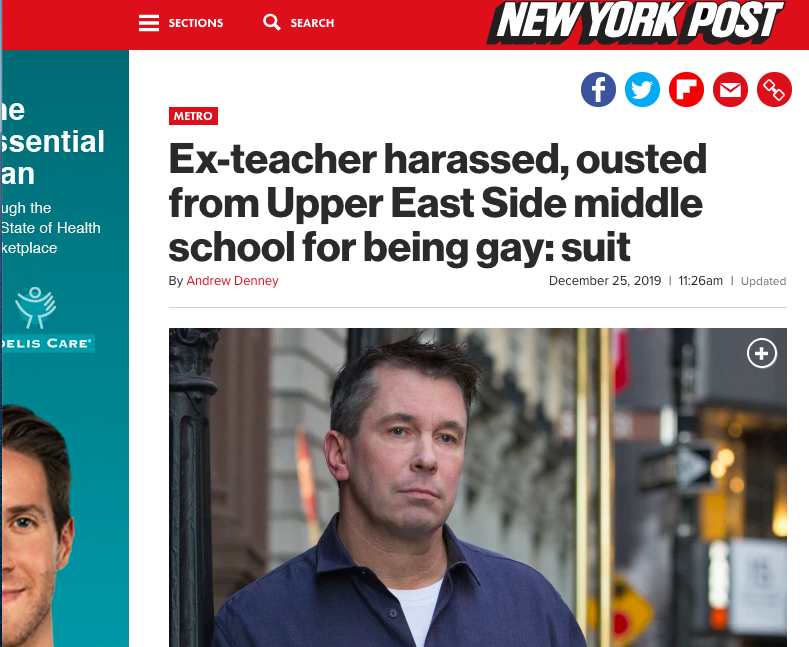
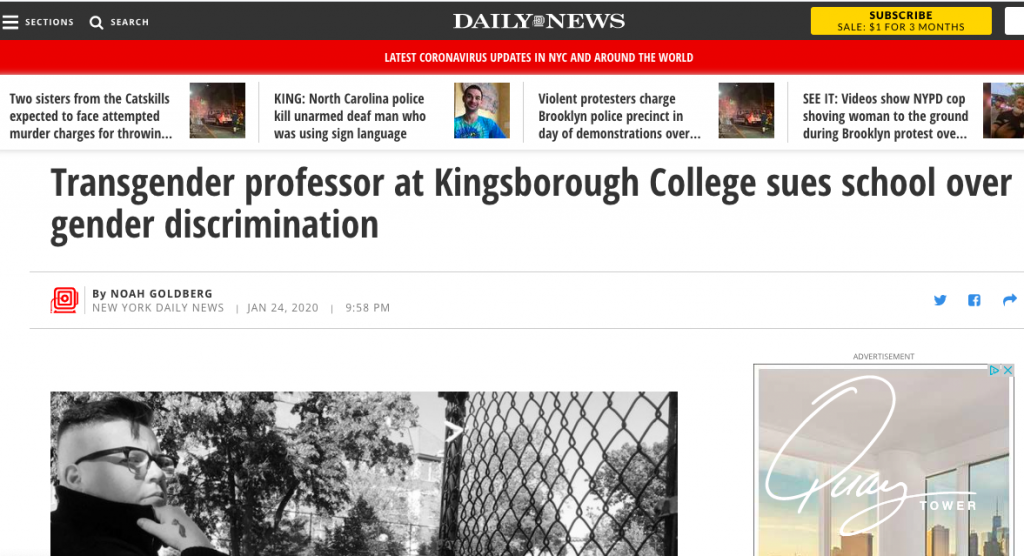
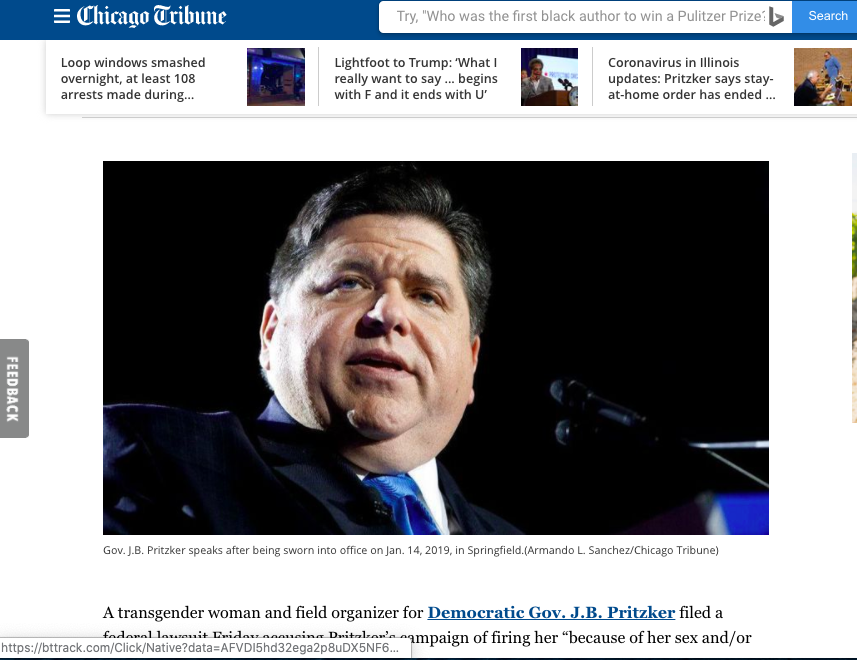
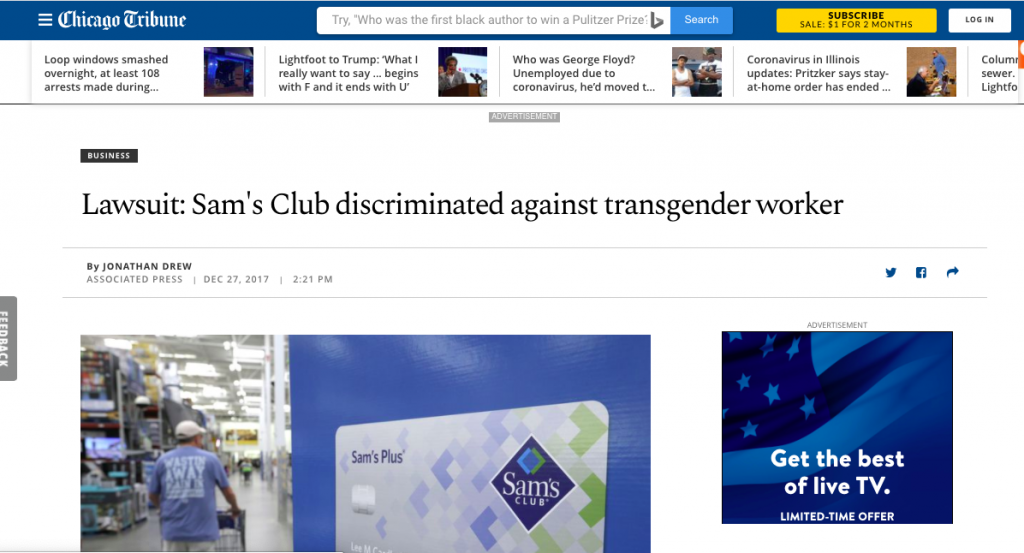
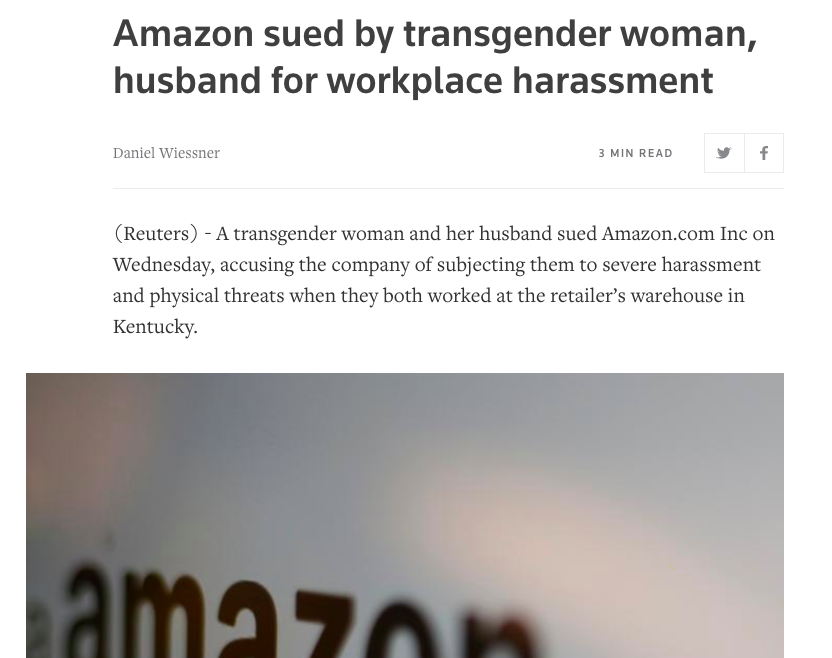
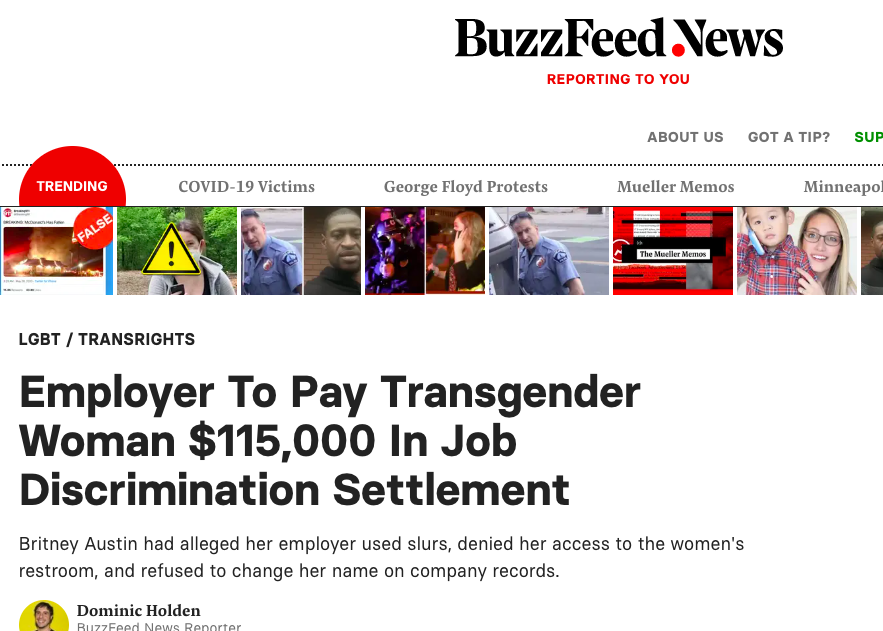
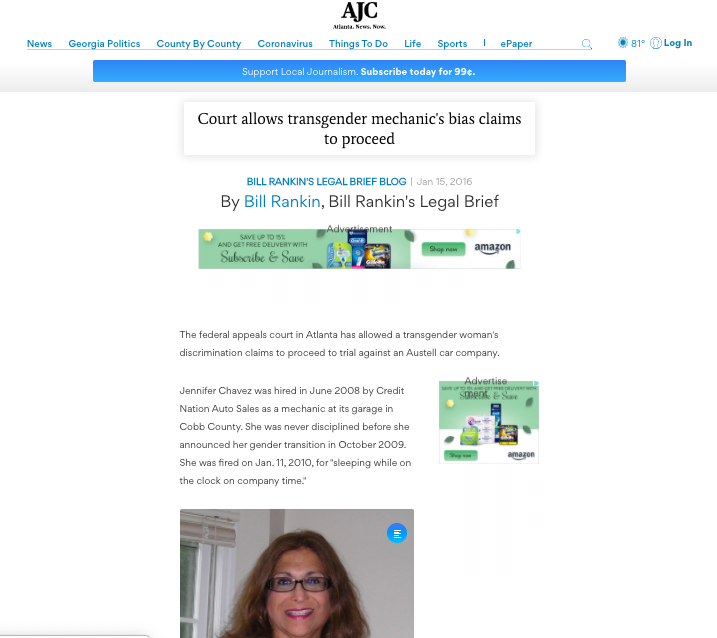
One Response to Previous Cases